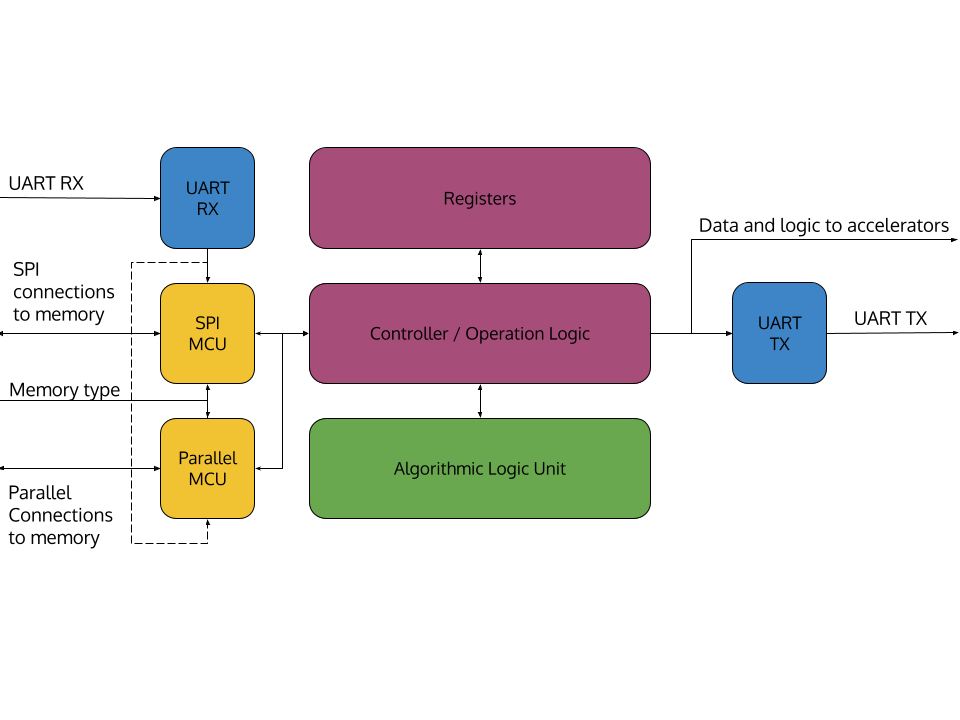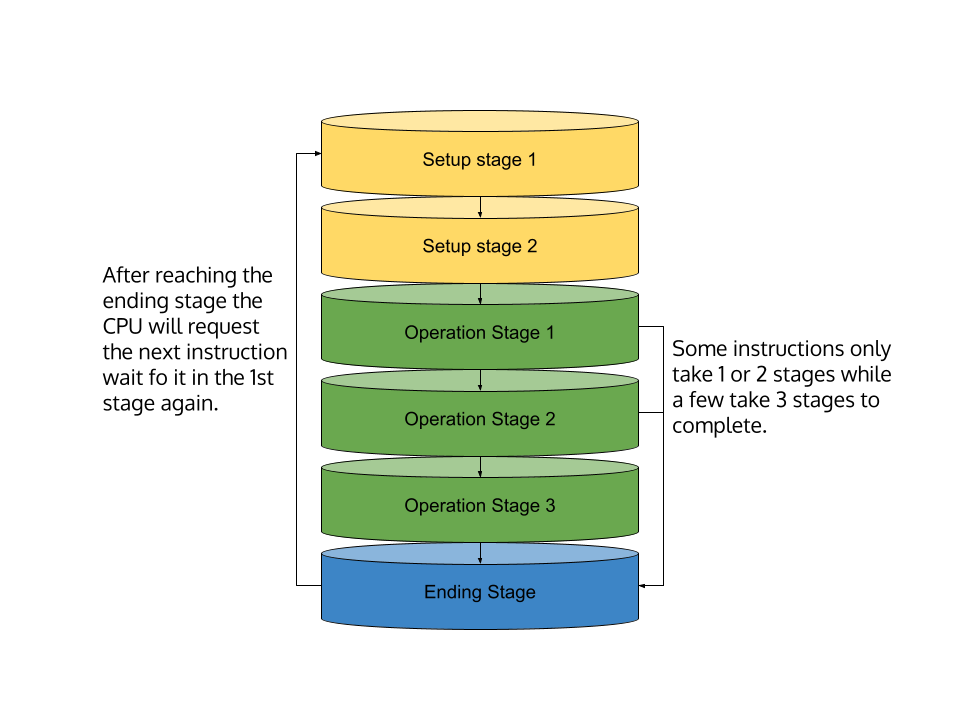966 Zoom Zoom
966 : Zoom Zoom

- Author: Justin T, Andrew H, Simon Y, Kellen Y, Vallabh A, Nicole C
- Description: Custom Cpu with custome external memory bus and sha-3 and CORDIC accelerators
- GitHub repository
- Open in 3D viewer
- Clock: 60000000 Hz
What is Zoom Zoom?
Zoom Zoom is a custom, 16-bit, barebones CPU. We store memory externally using either a custom parallel connection or SPI. We also have a simple UART protocal implemented on the CPU as well as numerous accelerators(that may not be included in the final design due to size constraints). (Link to Document with helpful coding info)

Detailed List of Features
- Custom Architecture and ISA
- 16-bit instructions
- 5 types of instructions
- 6 general purpose registers
- 1 flag register
- 1 zero register
- UART Interface
- SPI and Custom Parallel Memeroy Interface
- 16 bit memory address
- supports up to 65536 memory addresses(2^16)
- Flexible design easy integration of accelerators as instructions
The Architecture

Instruction Layout

General Instructions
| Instruction | Name | Type | Opcode | Settings | Description |
|---|---|---|---|---|---|
| nop | No Operation | 0 | 0000 | ||
| ld | Load | A | 0101 | 0 | reg out = mem[mem[inst addr + 1]] |
| ldr | Load Register | A | 0101 | 1 | reg out = mem[reg1] |
| str | Store | A | 0110 | 0 | mem[mem[inst addr + 1]] = reg2 |
| strr | Store Register | A | 0110 | 1 | mem[reg1] = reg2 |
| ldi | Load Immediate | L | 0111 | reg out = L9[7:15] |
ALU Instructions
| Instruction | Name | Type | Opcode | Settings | Description |
|---|---|---|---|---|---|
| add | Add | A | 0001 | 000 | reg out = reg1 + reg2 |
| sub | Subtract | A | 0001 | 001 | reg out = reg1 - reg2 |
| mult | Multiply | A | 0001 | 010 | reg out = reg1[0:7] * reg 2[0:7] |
| nand | NAND | A | 0001 | 011 | reg out = !(reg1 & reg2) |
| addi | Add Immediate | I | 0010 | 0 | reg out = register 2 + L8[0:7] |
| multi | Multiply Immediate | I | 0010 | 1 | reg out = register 2 * L8[0:7] |
| shl | Shift Legt | A | 0001 | 100 | reg out = reg1 << 0 |
| shr | Shift Right | A | 0001 | 101 | reg out = reg1 >> 0 |
Branching Instructions
| Instruction | Name | Type | Opcode | Settings | Description |
|---|---|---|---|---|---|
| jmp | Jump | A | 0100 | 000 | inst addr = reg1 |
| jmpz | Jump if Zero | A | 0100 | 001 | reg_out = inst addr; if (ZF) { inst addr = reg1 } |
| jmpg | Jump if Greater | A | 0100 | 010 | reg_out = inst addr; if (GF) { inst addr = reg1 } |
| jmpe | Jump if Equal | A | 0100 | 111 | reg_out = inst addr; if (EF) { inst addr = reg1 } |
| jmpl | Jump if Less | A | 0100 | 011 | reg_out = inst addr; if (!GF) { inst addr = reg1 } |
| jmpm | Jump if Memory Flagged | A | 0100 | 100 | reg_out = inst addr; if (MF) { inst addr = reg1 } |
| jmpu | Jump if UART Flagged | A | 0100 | 101 | reg_out = inst addr; if (UF) { inst addr = reg1 } |
| jmpi | Jump Immediate | A | 0100 | 110 | inst addr = mem[inst addr + 1] |
Programming the CPU
:warning: Memory Address 769 is reserved: The Assembler does not give a warning currently!
To assemble, we use custoasm with installation instructions here. We recommend installation via rust's package manager by running cargo install customasm. You can then compile an assembly file by running customasm -o <outputfilename> <filename>. The format for the assembly file is to add #include "x3q16_ruleset.asm" to the top of each .asm file as well as that file which is located here. Instruction memory and General Purpose are all located in the same place. Thus, to store general values in memory, just jump to wherever you store it in memory.
Accelerators
:warning: Many are still a work in progress or aren't supported by the assembler
Keccakf1600
Approximately 50% of the computational time for the Kyber Algorithm is hashing needed for random number generation. The Kyber algorthm uses SHA-3 and SHAKE algorithms to generate cryptographically secure random polynomials and numbers. Both of these algorithm rely on the keccakf1600 state permutation which target to accelerate. More information on the keccak algorithm can be found here and the kyber algorithm here.
The branch keccak_integration holds a complete state permuation accelerator however this is not included in main since it's too big to fit for tinytapeout. A smaller accelerator is currently being worked on.
How to test
Generate the binary file from test/x3q16 and load it into memory. Reset the chip and see if anything is written in memory.
External hardware
Either a SPI ram chip or a MCU emulator of parallel storage with custom protocol
IO
| # | Input | Output | Bidirectional |
|---|---|---|---|
| 0 | lower_byte_in | write_enable | DATA0 |
| 1 | upper_byte_in | register_enable | DATA1 |
| 2 | rx | read_enable | DATA2 |
| 3 | IN3 | lower_bit | DATA3 |
| 4 | IN4 | tx | DATA4 |
| 5 | IN5 | upper_bit | DATA5 |
| 6 | IN6 | OUT6 | DATA6 |
| 7 | IN7 | OUT7 | DATA7 |